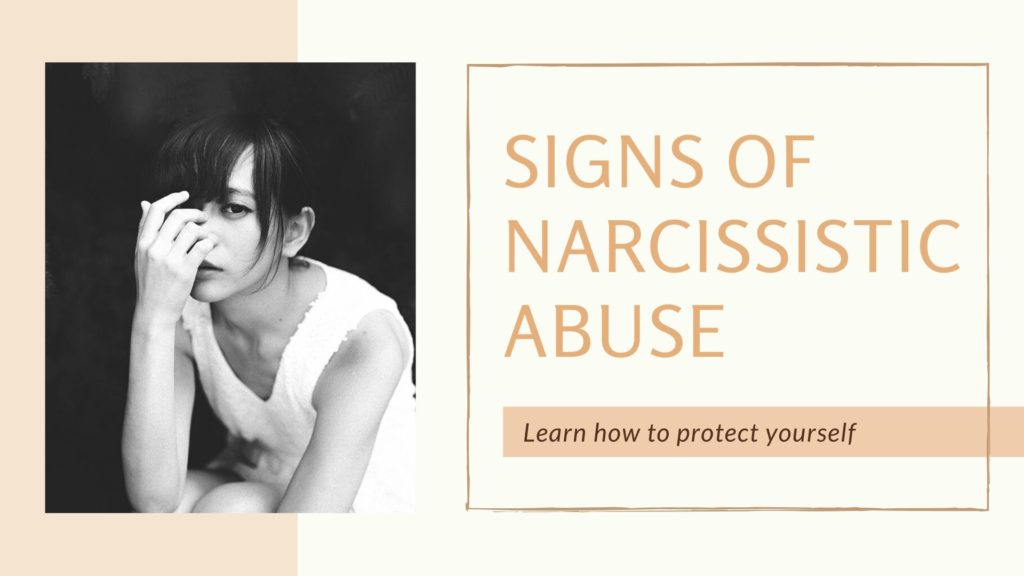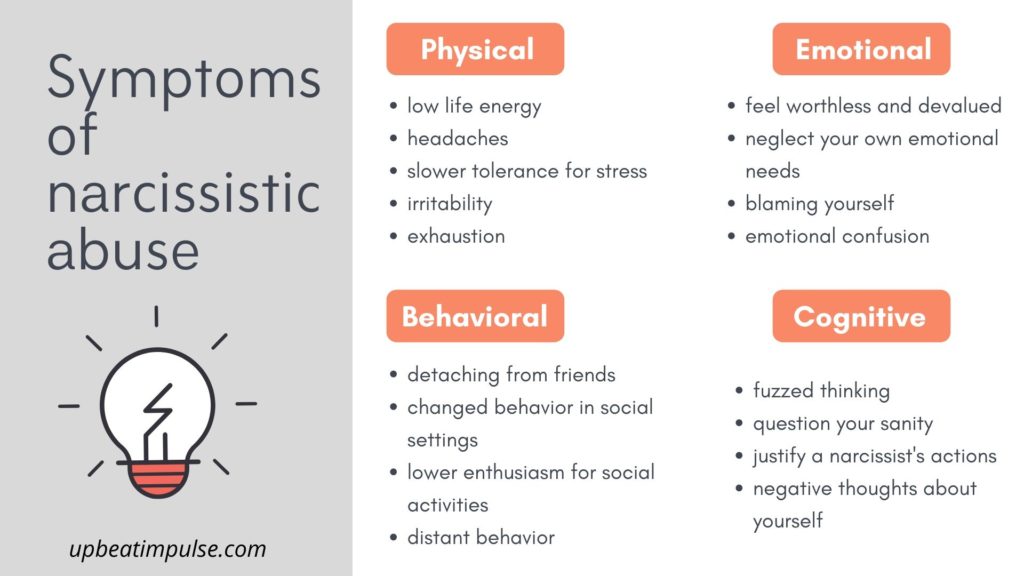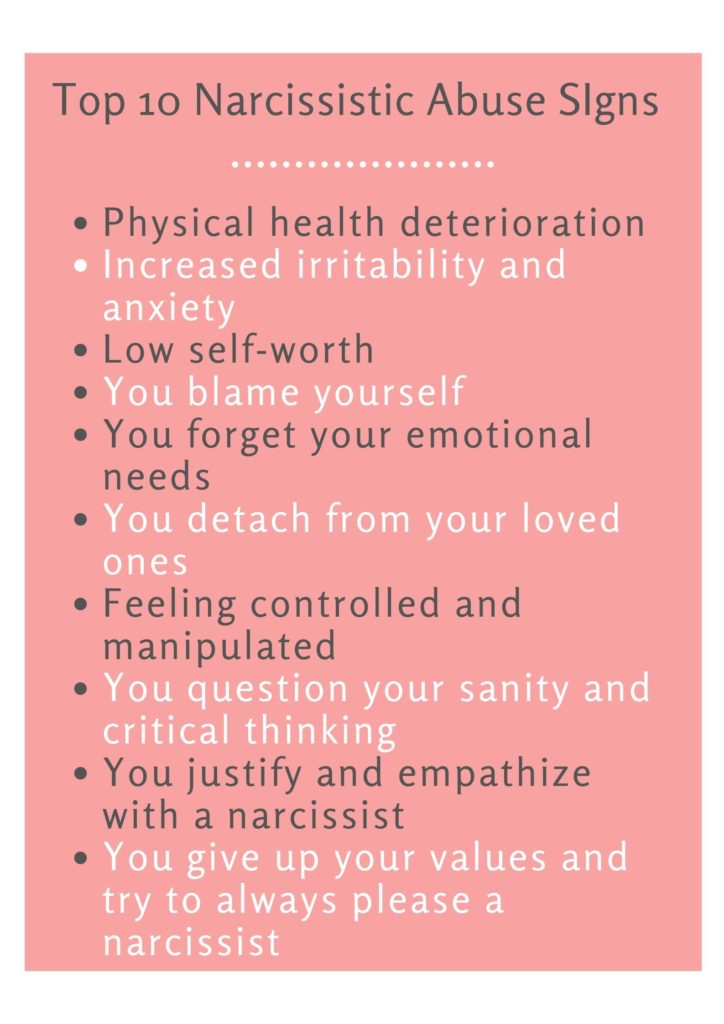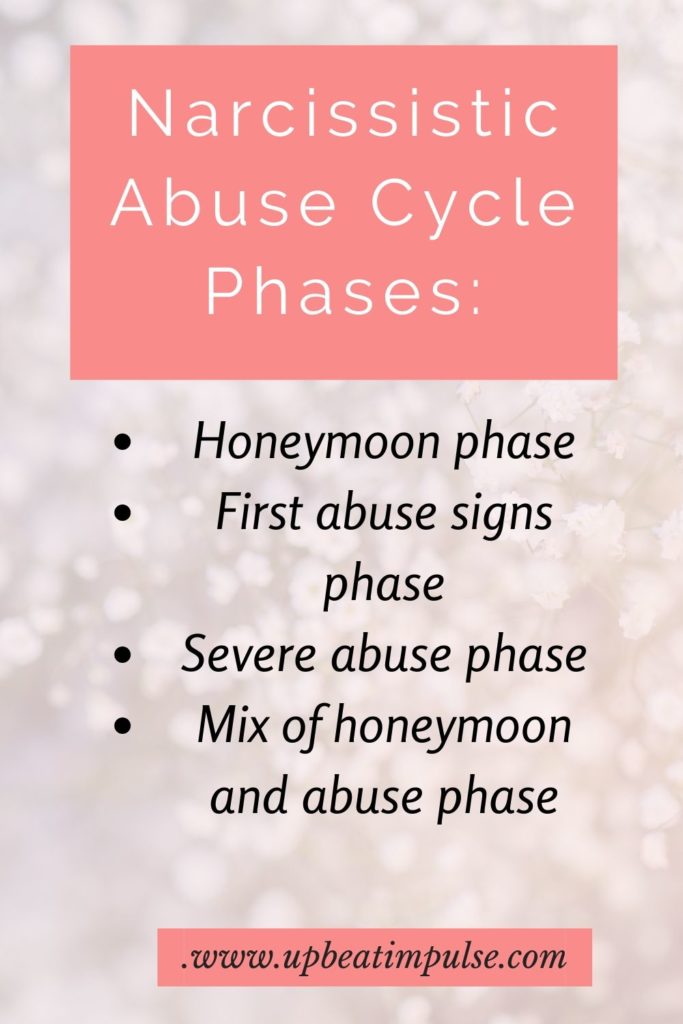Do you suspect you’re a victim of a narcissist abuse? Or maybe the victim is your friend, family member, colleague? In this post, we go in-depth explaining what are the main signs of narcissistic abuse syndrome and how to protect yourself.
Jump to signs of narcissistic abuse | What to do if you’re a victim of narcissistic abuse?

What is narcissistic abuse syndrome?
Let’s further explain the narcissistic abuse syndrome here.
Narcissistic abuse syndrome is a form of emotional abuse with elements of passive-aggressive behavior for the sake of controlling the victim.
The victim of this abuse can experience that his/her emotional, physical state is deteriorating, as well as the cognition might develop alternate ideas about low self-worth and devaluation. As a consequence, the victim adopts the altered state of consciousness and justifies a narcissist’s actions.
 Narcissistic abuse is a consequence of a narcissistic personality disorder, a severe and in most cases, incurable personality disorder. Dealing with a narcissistic person can be extremely exhausting, and the ultimate consequence is narcissistic abuse. If you believe you might be the victim of narcissistic abuse, you’ll need support and effective coping strategies.
Narcissistic abuse is a consequence of a narcissistic personality disorder, a severe and in most cases, incurable personality disorder. Dealing with a narcissistic person can be extremely exhausting, and the ultimate consequence is narcissistic abuse. If you believe you might be the victim of narcissistic abuse, you’ll need support and effective coping strategies.Are you the victim of narcissistic abuse?
Here are some bullet point to help you understand if you’re the victim of narcissistic abuse:
- Have you been abused and manipulated?
- Do you feel devalued, ridiculed, and downgraded to a belief that you worth nothing?
- Do you have a feeling that you’ve been going through a sort of a parallel reality, and have a distorted view on your worth and life in general?
- Have you been accused that you’re the one to blame?
- Or maybe, you’ve been told that you imagine things and that you can’t be trusted?
- Is all this coming from a person you love and thought you knew so well?
- Did he/she have totally opposite, loving and caring behavior at the beginning?
- Does he/she always play the victim?
That may be the first signs of narcissistic abuse syndrome. If you can find yourself in some bullet points above, you’re likely the narcissistic abuse victim. Or in other words, you experience the narcissistic abuse syndrome.
After all the hardships with a narcissist I experienced myself, I developed the Narcissistic Abuse Recovery Program aimed to help people who feel there is no way out. You can find it in the link below.
Signs of narcissistic abuse syndrome classification
I have pilled up and classified the major signs of narcissist abuse syndrome. If you can recognize yourself in some of them, you might be the victim of narcissist abuse.

Since the impact of narcissistic abuse is severe, we can group signs of narcissistic abuse under several categories:
- physical signs
- emotional signs
- behaviroal signs
- cognitive signs
Let’s describe each of them further.
Physical signs of narcissistic abuse
- low life energy
- headaches
- lower tolerance for stress
- irritability
- getting tired easily
Emotional symptoms of narcissistic abuse
- feel worthless and devalued
- neglect your own emotional needs
- blaming yourself
- emotional confusion
Behavioral symptoms of narcissistic abuse
- detaching from friends and acquaintances
- changed behavior in social settings
- lower enthusiasm for social activities
- distant behavior
Cognitive symptoms of narcissistic abuse
- fuzzed thinking
- question your sanity and your ability to think clearly
- justify a narcissist’s actions
- negative thoughts about yourself
Studying these symptoms of narcissistic abuse may help you discover the victims of narcissistic abuse among your friends and family members, too.
Top 10 signs of narcissistic abuse syndrome
After we’ve explored the main physical, emotional, behavioral and cognitive signs of narcissistic abuse syndrome, let’s go deeper and describe each of them to get the whole picture.
Here are the top 10 most prominent signs of narcissistic abuse:

Physical health deterioration
Gone are the days when you had an abundance of energy and you were in a good mood. Now, you feel drained, exhausted, and just tired of life in general.
Constant argues with a narcissist have sucked all your life energy and you’re tired more than ever. Your immune system may weaken and you may notice frequent infections.
Increased irritability and anxiety
Also, you’re more prone to stress and you notice you’re getting more anxious. Your tolerance for stress substantially declined and you notice you’re constantly agitated and in a bad mood. You feel like you can get upset and distracted easily, and that you lost your inner peace and tranquillity.
Low self-worth
You feel you’re not good enough just to walk away since you’ve been criticized and told that you’re not good enough. Therefore, you’ve developed a distorted view of yourself and your worth.
Consequently, you begin to question your common sense and the vicious cycle just keeps getting worse.
Finally, you end up confused, unable to make rational decisions and stuck where you are.
You blame yourself
You’ve been feeling brainwashed by a narcissist. He/she has convinced you that you’re the one to blame for every action.
Eventually, you start believing that you are the one who’s wrong.
Moreover, you excessively bother to please a narcissist and walk on eggshells. You change your behavior accordingly, and you’re under a strong grip on a narcissistic influence.

You forget your emotional needs
You become confused about your own emotional needs because you put a narcissist first. You don’t know clear answers to these seemingly simple questions, such as:
“What do I want?”
“What do I need from this relationship?”
“Am I happy here?”
“Am I neglected, or maybe abused and controlled?”
In case your mind is blurred and you’re confused about your emotions, a narcissist has done his/her job to meddle with your emotions.
Why is this bad for you? Forgetting your emotional needs will keep you confused, and you won’t be able to make decisions at your favor. Likewise, a narcissist will manipulate you more easily.
You detach from your loved ones
You are neglecting the other relationships you have, like friends and family. To some extent, this happens because a narcissist tries to turn you against them.
Moreover, a narcissist will do all to ruin your other relationships and to make you more dependent on him/her. That way, he/she can have full control over you and be the only person you interact with.
Feel controlled and manipulated
You have some vague insight that a narcissist manipulates you, but you’re unable to act accordingly and protect yourself. You sometimes catch a narcissist in a lie and find inconsistencies in her/his stories. You see the story he/she presents to you doesn’t add up. Lies and manipulation are the narcissist’s main characteristics.

You question your sanity and critical thinking
“What the hell is wrong with me?”
“Am I normal?”
These and many other similar questions appear here and there and become more frequent as the narcissistic abuse intensifies. You feel like you’re in a sort of parallel reality, up to the extent that you don’t know what’s true or false.
You’re confused about your own life choices, decisions, and thinking process itself. It doesn’t seem to you like you’re a normal person anymore. Your passivity and reconciliation with he narcissistic harsh and abusive nature surprise even you, but you do nothing about it.
It seems like you are not able to think clearly no more. Even a simple activity requires insane amounts of mental effort and concentration. You wonder how to get by yourself without a narcissist. Since you firmly believe you can’t do it, you stick with him/her.
You justify and empathize with a narcissist
“She/he’s not the one to blame.”
“He/she had a rough childhood and can’t account for his/her actions.”
“It’s just the way she/he is.”
“I can’t leave him/her right now, she/he won’t take it. He/she needs my emotional support right now.”
“With my unconditional love, I can make him/her more empathic and loving person.”
The statements above speak for themselves. You justify a narcissist’s actions and emotions filled with rage and abuse. He/she is a passive subject in your story who suffered a lot and now it’s up to you to put her/him on healthy foundations.
Wrong attitude.

You give up your values and try to always please a narcissist
Everything that you loved, valued or respected is put aside now. You’re not the same person you were earlier before a narcissist has entered your life and shook your foundations.
For example, you were a loving and caring friend. Now, you justify a narcissist harsh actions oriented towards his/her, or what’s even worse your friends.
Or, maybe you were making jewellery as a hobby, and narcissist came into place and disliked it with his/her exaggerated expression of negative attitudes. Then, you notice that you start wondering how could you ever make such ugly jewellery.
Narcissistic Abuse Cycle
The main issue with narcissistic abuse is the erratic nature of abuse. There are numerous carefully planned actions by a narcissist to confuse you and get you under their skin.
Narcissists are a special sort of toxic people that’s hard to deal with.

Honeymoon phase
All the narcissistic abuse cycles start with almost endless love, affection, and idealization by a narcissist. If you’ve dealt with a narcissist, you know too well this, so-called “honeymoon phase”.
In this phase, a narcissist seems like a perfect person to be around at first, and it seems like he/she gets you. You believe you’ve found your soulmate, a perfect friend or a person to be around. You’re filled with pure happiness.
First abuse signs phase
Nevertheless, the second phase comes sooner or later. Here you notice the very first signs of abuse.
After the idealization, here comes the passive aggressiveness, rude comments, first efforts to make you feel devalued, and first actions to steal your self-esteem.
You’re doubtful and believe this is just a small unpleasant phase. You don’t fuss much about it, but you feel uncomfortable. In this phase, a narcissist is testing your limits and planning his/her next actions.
Severe abuse phase
The next phase is a more sinister one. You have been threatened, assaulted, called insane, and told what to do.
This is the phase you realize you’re in deep trouble but you don’t know how to escape. Also, you still have some hope that things might get better soon.
Also, the narcissist tactically confuses you with minor and sporadic bursts of love, gifts, and small signs of attention.
Mix of honeymoon and abuse phase
The next phase continues. You’re aware that you need to escape, and you might have some violent efforts of breaking up, but no avail. A narcissist may stalk you and turn others against you while promising miracles to you.
The erratic cycle continues with the honeymoon and devaluation episodes. You strongly believe there is no way out and even start believing you worth nothing.
Unfortunately, many of us know this too well. A promising friendship or relationship turns into a nightmare. Or, your family member got you under their control for years and you’re seemingly helpless.
Narcissistic victim syndrome recovery
A narcissistic victim syndrome survivor has numerous hardships to deal with. The process is painful and hard, but with determination and experts’ help can lead to satisfactory results.
The stages of a narcissistic victim syndrome survivor recovery
Accept the reality
In the first stage, you need to convince yourself that a narcissist cannot change. That is not possible. This is the reality of their personality disorder. That can be painfully hard since the person you loved and idealized for so long is now being displayed without their masks, stripped to the core.
Decision to break free
The second stage is making decision to break free from the narcissist. You need to admit that you need to change your life and that the change is painful but inevitable. If you manage to break the chains from your narcissist, that’s a huge step ahead. However, as we know, a narcissist will do all that’s in his/her power to make you stay. The strategies may vary from threatening, physical abuse, locking, or even sweet honeymoon phase and promises that he/she will change for real.
Healing stage
The third stage is the healing stage. This is when all your healing process will take place. However, in days that will come, you need reliable experts to help to put you back on firm foundations. Sometimes, you’ll need to attend a huge number of seances before you notice any positive changes in your behaviour, emotions, attitudes and self-esteem.
Adopting the changes & grow
The final stage is finally adopting the changes, building your self-esteem from ashes, work on a positive mindset, and using your previous terrible experience with a narcissist as a life lesson. It will take long until you reach this stage but it’ll worth all the efforts, headaches and heartaches.
What is the victim’s freeze response
This type of response is surprisingly common at survivors of narcissistic abuse. Since narcissistic victims receive a lot of mental abuse, the mind shuts off, and a victim is unable to either fight or flee.
The victims’ freeze response is characteristics to traumatic experiences, and there’s science behind it. Freeze response comes as a result of a sudden shock a narcissistic abuse victim is exposed. The sudden shock goes unpredictably and unexplainably.
A narcissist uses our vulnerability to be brutal with us. That is horrifying to the extent that our brain is unable to react properly.
Science shows that in situations like that, the brain starts to produce stress hormones to the extent that normal body can’t take it. Therefore, our brain shuts and let our body focus on its vital functions.
How to break the narcissistic abuse cycle?
Having a narcissist in your life is a tough battle. Once you realize their toxic behavior, it’s basically the tip of the iceberg. Narcissists in our life influence us in many different toxic ways. More or less, the people under a narcissist influence go through similar hardships. If a victim is exposed to severe and permanent narcissistic influence, we call it a narcissistic abuse syndrome.



